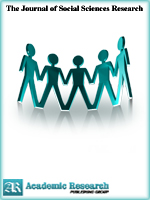The Journal of Social Sciences Research
Online ISSN: 2411-9458
Print ISSN: 2413-6670
Print ISSN: 2413-6670
Quarterly Published (4 Issues Per Year)

Archives
Volume 4 Number 7 July 2018
Livelihood Framework: Understanding Poverty and Vulnerability and Coping Strategies of the Urban Poor in Dhaka
Authors: Halima Begum ; Golam Moinuddin
Pages: 101-108
Abstract
Livelihood framework suggests poverty as a product of interrelated factors such as low income, weakness, isolation vulnerability and powerlessness. This article is an investigation into the poverty and vulnerability relationship of the people living in the slums of Dhaka city. It presents an analysis of various factors that contribute to the vulnerabilities of the urban poor in Dhaka and explores their various adaptation or coping strategies in reducing their vulnerability. The article is based on data collected from 329 households in four different slums in Dhaka city. From the analysis it is found that the poor are vulnerable due to lack of education, skill as well as income and to cope with this vulnerability they adopt some strategies such as expenditure reducing living in a compromised housing condition, income raising by involving more family members in the workforce, getting involved in petty trading and other multiple economic activities, maintain social and kinship networks and getting them involved in NGO led community development activities.
Socio-Economic Factors Influencing the Initiation of Water Projects in Nigeria: The Example of Sustainable Ibadan Project (SIP)
Authors: OLUSA, Adekemi Opeyemi
Pages: 95-100
Abstract
Socio-economic factors such as age, income, sex, marital status among others determine the purchasing power of an individual and have much influence on what the individual will engage in and type of project(s) such individual and group of individuals or community will embark upon. Issues that would be of interest to men folks may be different from that of the women folks and there may be areas of overlap of interest due to various reason(s). This study investigated the effects of socio-economic factors on the initiation of water projects by Sustainable Ibadan Project in Ibadan, Nigeria. Nine water projects were identified under the Sustainable Ibadan Project, of which, six (6) were development of natural springs and 3 were borehole projects that spread over 6 Local Government Areas in Ibadan. A total of 729 users were sampled for this study. Age and household-size had negative correlation while income had positive correlation. Sex, level of education, occupation and marital status were significant at 0.01 Alpha level. The study also confirmed that apart from the socio-economic characteristics of the users, the preservation of cultural heritage, especially in communities that have natural spring projects played a very significant role in the initiation of the water projects. The paper called for the replication of these water projects in more communities in Ibadan.


